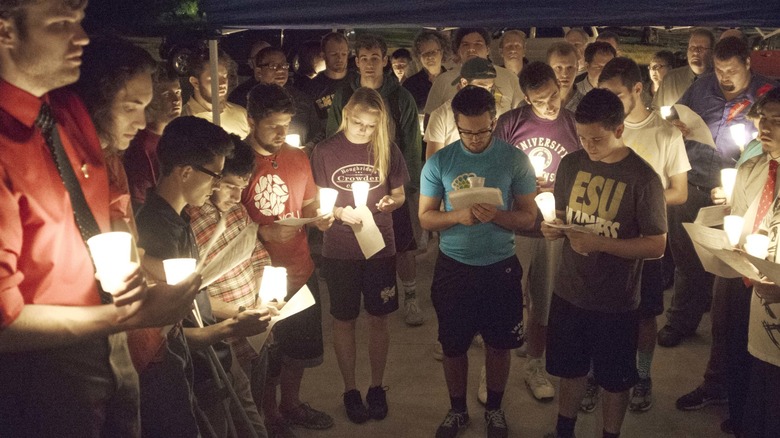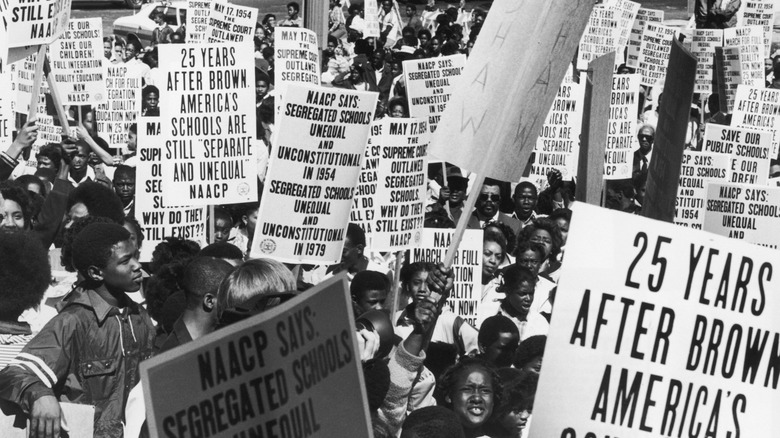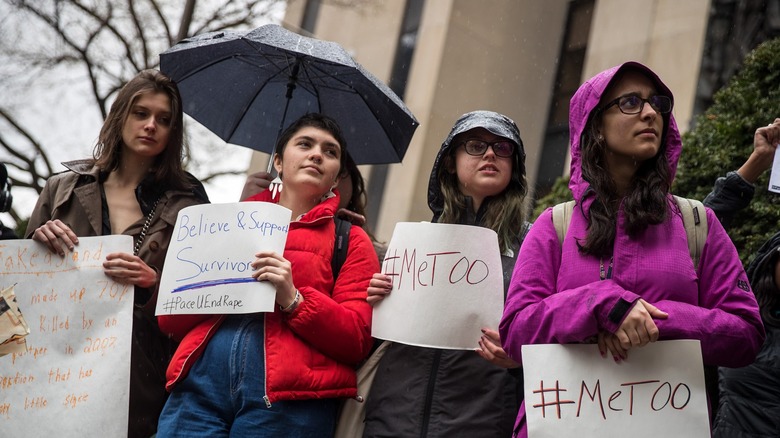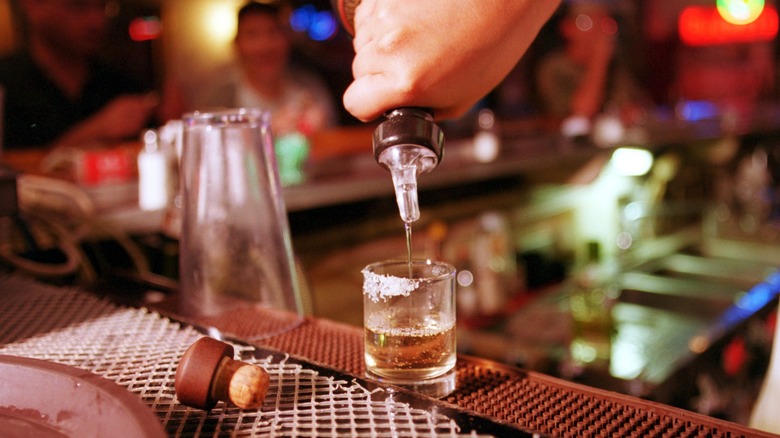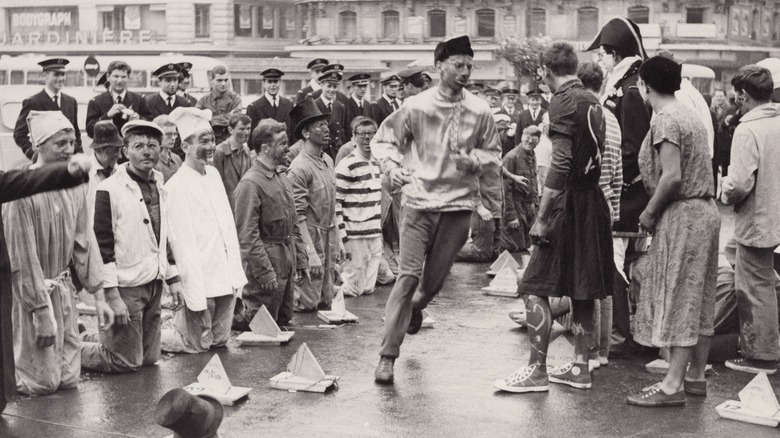The Dark History Of Collegiate Greek Life
For many incoming students, joining a fraternity or sorority — also known as Greek Life — is one of the defining moments of their college career. While participation in fraternities and sororities varies widely depending on the school, overall it is a pretty massive industry. Not only that, but the vast majority of U.S. presidents, vice presidents, members of Congress, senators, and even Supreme Court justices, have all been a part of a fraternity or sorority.
The first Greek life houses sprung up in the late 18th century, and by the end of the 19th century they were popping up everywhere. Yet, that's when many enduring issues first started, including the segregation of Black and white organizations, which was legal at the time. Today, while segregation no longer exists, many of the problems have still continued to fester and grow over the years, and new ones are occurring all the time.
Unfortunately, for all of the prestige and pomp associated with Greek life at colleges, there are also some disturbing and alarming details, too. In recent years, we've seen the front pages of major newspapers flooded with allegations surrounding sororities and fraternities, but these are far from new. Dating back more than a century, Greek life has had issues with racism, sexual assault, excessive alcohol use, LGBTQ+ discrimination, and more. Looking back, this is the dark history of collegiate Greek life.
Greek life's tragic history of racism
One of the most unfortunate legacies of Greek life in America is its complicated history with racism. When the first Greek fraternities were founded in the 18th century, they were largely reserved for white students rather than students of color. This was a time when enslavement was still legal and widely practiced throughout the United States, and the number of Black students in higher education was unfortunately very small.
By the early 20th century, most campuses in the U.S. were completely white or legally segregated. When colleges began admitting Black students, many of them still found it difficult, if not impossible, to join any Greek institutions, some of whom had specific clauses not allowing non-white members. This led to the proliferation of many Asian American and Black Greek societies at around the same time. While some students found opportunities at historically Black colleges and universities (HBCUs), those within Greek life at segregated schools sadly often found themselves discriminated against and called racial epithets.
When the Supreme Court nullified segregation in the 1950s, historically white Greek societies were forced to integrate, but it's a process that has been painfully slow, if not nonexistent in some places. Even in 2013, several University of Alabama sororities came under fire for allegedly prohibiting Black members from joining, and in 2017, a noose was found at a fraternity at the University of Maryland.
Sexual assault has long been a problem
Another of the most deplorable legacies of Greek life on American campuses is the shocking prevalence of sexual assault. It has long been an open secret on campuses that fraternities are often places where sexual assault occurs, and it is far from a new phenomenon. According to a 1957 study published by the American Sociological Review, a high proportion of fraternity brothers were implicated as among the top offenders of sexual aggression.
More current studies have hardly been more kind. According to Esther Wright in her 1996 book "Torn Togas: The Dark Side of Campus Greek Life," not only do some studies show that frats are responsible for a disproportionate number of allegations, but they even go out of their way to promote the behavior. The problem is also not just at frats. In "Hazing: Destroying Young Lives," Douglas Fierberg and Chloe Neely argue: "... sorority women are 74% more likely than other college women to experience rape." Some schools, like Florida State University, actually have entire webpages warning potential students about sexual assault and Greek life.
Sadly, it appears little has changed in recent years. In 2011, the entire Delta Kappa Epsilon fraternity at Yale was kicked off campus for five years after making pledges chant slogans implying sexual assault. In 2022, Cornell University banned all fraternity parties due to sexual assault and drugging allegations.
If you or anyone you know has been a victim of sexual assault, help is available. Visit the Rape, Abuse & Incest National Network website or contact RAINN's National Helpline at 1-800-656-HOPE (4673).
Greek life students now drink a lot more than average
Movies like "Animal House" and "Revenge of the Nerds" have long maintained a connection between Greek life and raging parties, and it's pretty common knowledge even among those who aren't members. Yet, while recent studies associate Greek life with excessive alcohol use, that doesn't appear to have always been the case.
In their 1953 book "Drinking in College," Robert Straus and Selden D. Bacon wrote that drinking at colleges varied so much that being in a fraternity did not necessarily equate with more drinking, and that the vast majority of drinking did not take place in Greek houses. However, several decades later, that appears to have changed. According to "The Higher Education Center for Alcohol and Other Drug Abuse and Violence Prevention" in 2008, a much higher percentage of both fraternity and sorority members drank compared to non-Greek life peers, and Greek houses are where most of the partying happens. Additionally, a 1995 study found that 80% of sorority sisters and 86% of fraternity brothers in Greek houses engaged in binge drinking — more than double their non-Greek peers (via The New York Times).
This has led to troubling results in recent years, including missing classes, doing badly on tests, getting into arguments and fights, suffering memory loss, arrests and jail time, and even injuries. Alcohol and excessive alcohol use are also common factors in sexual assaults on campus. Times definitely have changed — and apparently not for the better.
The ugly legacy of hazing
For Greek houses, few things are as important as "rushing" or pledging. Without pledges, Greek societies couldn't recruit new members and survive, making them crucial for sustaining houses for the future. Usually, "rush week" or rushing is a multi-day process, when many students compete against each other to be chosen by a particular fraternity or sorority, and after rush comes pledging, which usually lasts around six weeks but can go longer.
Unfortunately, both rushing and pledging have long been associated with hazing. Some of the earliest evidence of hazing dates all the way back to 1892, at the Delta Kappa Epsilon fraternity at Yale University, when a pledge accidentally stabbed himself and died a few days later after becoming ill (via Hank Nuwer's "Wrongs of Passage: Fraternities, Sororities, Hazing, and Binge Drinking"). Sadly, it looks like over the past century, little has altered. Since 1970, at least one student has died every single year (through 2021) due to hazing-related activities at a collegiate Greek society in the U.S.
Not all incidents have ended in death, either, but they have continued. In 1980, a Sigma Phi Epsilon pledge was involved in an incident where he was burned by hot pancake batter and lye being poured on his head, as reported by The Washington Post, and in 2023, two fraternities were in trouble at the University of Florida for hazing (via the Alligator).
There have been several fraternity drug dealing rings
It might sound pretty surprising at first, but over the years, there have actually been a number of drug rings among Greek life students at major universities. Granted, while the appearance of illegal drugs might not be completely out of the ordinary in Greek life, that frats have actually been drug conduits for students takes this to another level.
One of the earlier cases was back in 1988, at the Beta Kappa Phi fraternity at the University of Massachusetts (via United Press International). Not only were several frat students distributing illegal drugs like cocaine, but they were also selling alcohol to underage students and operating an illegal bar, too. In 1991, at the University of Virginia, three frats — Delta Upsilon, Tau Kappa Epsilon, and Phi Epsilon Pi — were all raided by officers who found everything from marijuana to LSD and made several arrests.
Far from being a problem of the past, fraternities are still finding themselves involved with drug dealing in more recent years, too. In 2020, the Phi Gamma Delta, Kappa Sigma, and Beta Theta Pi frats at UNC-Chapel Hill, Duke University, and Appalachian State University, all had an intertwined drug ring that sold more than $1.5 million in drugs from 2017–2020, and led to their suspensions.
Underage drinking is rampant
For many decades, underage drinking has been a problem on campuses. According to Robert Straus and Selden D. Bacon in their 1953 book "Drinking in College," at the time, an incredible amount of first-year students drank alcohol: 69% of the men and 46% of the women. Yet, while back then underage drinking was not linked specifically to Greek life, it seems to be the case in recent decades.
According to a 2009 article in Psychology of Addictive Behaviors, Greek students were more likely to buy fake IDs and were thus more likely to be engaging in heavy drinking than non-Greek peers. Another 2009 study, from Current Drug Abuse Reviews, showed that alcohol use and pledging in the Greek system were incredibly intertwined, and that some younger members drank to seek the approval of older members.
News reports over the past few decades have continued to highlight issues with underage drinking and Greek life. Since the late 1970s, dozens of fraternity students have died either from drinking too much or from injuries sustained while drinking, and a 1998 The New York Times article found that underage drinking at off-campus fraternities was a huge problem. In September 2017, the Alpha Chi Rho fraternity at Penn State was suspended after underage women drank so much they had to be hospitalized, and the same month, an 18-year-old died at the Phi Delta Theta frat at Louisiana State University from excessive drinking.
Many students have died over the years
Joining a Greek house is supposed to set a solid foundation for starting a successful college career. Unfortunately, many Greek students have died over the years, haunting Greek life for well over a century. One of the earliest documented incidents dates all the way back to 1873, when, according to an article in The Cornell Daily Sun, Kappa Alpha Society pledge Mortimer Leggett died after he accidentally fell off a 37-foot cliff while walking in the dark. From 1873-2001 alone, there were well over 100 fraternity members or pledges who died (via Hank Nuwer in "Wrongs of Passage").
Tragically, the deaths have occurred over a wide variety of activities, from excessive alcohol use, to hazing, to car accidents, and even murder. To give a few examples, in 1928, a Delta Kappa Epsilon pledge died from a hazing ritual where he was electrocuted, and in 1940, a Theta Nu Epsilon member died after excessive alcohol intake. A Sigma Pi member was killed in 1950 after being hit by a car, and 29 years later, in 1979, two fraternity brothers were shot to death at a frat party. More recently, in 2017, a Beta Theta Pi fraternity pledge fell down a set of stairs after underage drinking, fatally injuring himself.
Many frat members have faced serious criminal charges
Over the years, fraternity brothers have gotten themselves into some pretty serious trouble, and many of them have faced significant criminal charges as a result. These date back to at least 1895, when a member of Dartmouth's Alpha Delta Phi fraternity was accused of grave robbing a dead body and dragging it across a cemetery (via The New York Times).
In the years since, countless fraternity students have found themselves in serious trouble with the law, with many of the charges related to murder and drugs. They include a fraternity member from the University of Oklahoma was acquitted of murder charges after a 1934 trial (via The New York Times), and a Sigma Phi Epsilon brother who faced murder charges after his date was found dead at the fraternity house in 1949 (via The New York Times). Decades later, in 1974, a botched pledge initiation wound up in murder charges after a pledge was shot to death (via The New York Times).
Additionally, in 1988, the Beta Kappa Phi fraternity at the University of Massachusetts saw at least one member facing cocaine distribution charges after a bust (via United Press international). Thirty years later, 2021, a fraternity pledge of the University of Kentucky was acquitted of reckless endangerment but convicted of DUI after hitting and killing a 4-year-old after drinking at a frat party.
The presence of STDs
Within Greek life, one of the worst kept secrets is without a doubt the seemingly large presence of sexually transmitted diseases amongst members. While data on the historical presence of STDs in Greek life is hard to find, it has been a problem since at least the 1980s.
In her book "Torn Togas," Esther Wright drew upon her own college experiences in the late-1980s and early-1990s to acknowledge that positive STD results were extremely common among Greek life members at her school, and they spread like wildfire due to poor hygiene among many students. Wright also acknowledged that some members would deliberately lie about their status to potential partners out of shame, worsening the spread even more.
A few decades later, according to a 2008 study in the Journal of Behavioral Medicine, Greek life students still had sex more often with more people, had more encounters while under the influence of drugs or alcohol, and even assumed they were at greater risk for STI infections like HIV due to their habits. More recently, a 2021 study in the Journal of American College Health, concluded that being a Greek student was still associated with an increased likelihood of having riskier sexual encounters.
LGBTQ+ discrimination has long been problematic
Sadly, many in the LGBTQ+ community have historically found it hard to integrate into the Greek life system, and there is a dearth of historical research that can partly be attributed to homophobic attitudes. Still, there have been several widely publicized homophobic incidents among Greek organizations over the years, as well as a clear reluctance to ask openly gay members to pledge to most houses.
In 1986, Delta Lambda Phi became the first gay and lesbian fraternity, a huge landmark in Greek life history, but that was far from the end of discrimination. In one horrible example from 1998, a student at Colorado State University was threatened with death upon trying to bring a gay fraternity to campus (via The New York Times). The same 1999 article mentioned that most gay students did not feel comfortable coming out to their fraternity mates until the 1980s and that the majority still didn't, 70% faced homophobia from fraternity mates, and that Greek students were more likely to harbor discriminatory bias than non-Greek students. Additionally, transgender students have found trouble being accepted into Greek societies that align with their gender identity, though more organizations are now changing bylaws to be more trans accepting (via The Guardian).
Recently, in 2021, the Phi Gamma Delta fraternity at Tulane University faced suspension over using a homophobic slur in a recruiting document. Greek life has a long history of LGBTQ+ discrimination, and one that still continues in some areas today.
Illegal drugs have long been a normal part of Greek life
As it turns out, along with underage drinking, illegal drugs have long been a routine part of Greek life for many students. Back in 1966, the Saturday Evening Post published a story titled "Drugs on Campus," and it was evident even back then how rampant illicit marijuana misuse was for many Greek students. The story commented that this was prevalent at Columbia University's fraternities in particular, but that to access it, you had to know a secret knock and that it was a boy's-only club. At other schools in Wisconsin, Chicago, and Minnesota, marijuana misuse was still common, but far less so among Greek members.
As it turns out, decades later, little has changed. According to a 2008 study published in the Journal of Behavioral Medicine, the majority of Greek life students had misused marijuana and other drugs, and were more likely to do so than non-Greek members. Other popular drugs among Greek students were reportedly cocaine, amphetamines, ecstasy, and even hallucinogens.
